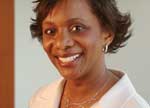
Candace Sheffield Matthews grew up in nearby New Brighton, Pa., as the daughter of a minister and homemaker. The youngest of 18 children, she received an undergraduate engineering degree from Carnegie Mellon in 1981, and an MBA from Stanford. She rose through the ranks of corporate America to become one of the leading female marketers in the nation. The mother of twin girls, she is now CEO of SoftSheen-Carson— a consumer products division of L’Oreal USA—a member of the Carnegie Mellon Board of Trustees, and an active proponent of access to higher education for minorities. She was interviewed for Carnegie Mellon Today following her keynote address at this spring’s commencement.
You’re very passionate about giving young minority students opportunity through the L’Oreal SoftSheen-Carson scholarship program.
My mother used to say ‘Unto whom much is given, much is required.’ It was through similar scholarship programs that I gained the educational experiences that brought me this far in my professional career. I went to both Carnegie Mellon and Stanford on full scholarships. I also had mentors, like Bill Elliott, Sanford Rivers and Robbee Baker Kosak. I had a work- study job in admissions and they took me under their wing. I was their little sister. The school has done a tremendous amount for me in my career. You cannot discount the discipline that this school gives you. Those are skills that no one can take away and that you can apply to anything that you do. It’s a hard four years, but it is so worth it, because you can do anything from here. If I had it to do over again, I’d be right here.
What would you say to fellow alumni about this notion?
I just joined the Board of Trustees and learned about the endowment and how we compare to other schools. Well, it was amazing how paltry our endowment is relative to some other schools that I would compare us to, and a lot of that is because the alumni just haven’t been taught that it is part of their responsibility to give back to the institution. I think every alumnus should give something back, even if it’s only $100 a year, because $100 from 50,000 alums would mean a tremendous amount for this university. It doesn’t always have to be something major.
Do you have any advice for Carnegie Mellon’s women graduates?
You’re going to work as hard in your career as you did here. Women need a lot more perseverance. If you’re a woman of color you’re also going to be one of a very few. So you have to be able to function in many, many roles where there aren’t many people who look like you. There are no role models. You have to be comfortable enough with yourself to say, ‘You know what, I can do this.’ And you need a support network around you. That is critical.
If you want it all, you’ll get most of it. But at different times, something will have to be compromised. So you just get different pieces at different times of your life, and when you’re finished with your life, you will have had it all. It’s just not going to be as clear cut as you would expect it to be.
How has Carnegie Mellon changed since you were an undergraduate?
The interaction between programs was just starting to happen then. It’s amazing to see how far it’s come. We had a regional reputation as a great school that evolved into a national one, and now a world-class one. But Carnegie Mellon still needs to build an image. Our alumni are talking about it more. It’s getting lots of exposure for computer science, robotics and the fine arts, and it has a reputation. It’s the image part we have to work on.
The other thing I’ve noticed is the diversity. When I looked down the roster of graduates, I was amazed at the international representation. This is a great thing, because you are a better person when you broaden your horizons and learn more about other people. It’s just as simple as that. You can’t go through life thinking your world is the world. No matter what you do, you’re going to come across someone who is different from you.
You’re in the business of enhancing image. How important do you think that is for business?
I believe in the saying, ‘You only get one chance to make a first impression.’ I think the formula for success is 10 percent performance, 60 percent image and 30 percent exposure. When you’re applying for a top notch job, they expect the performance to be there. It’s the others that separate you from the crowd. You have to decide what you want to project at all times, and appearance is part of that, so make sure that you manage that. I hate to say that image matters, but it does. There have been numerous studies that prove it. Make eye contact. Smile. Polish your shoes. It’s the little things that count.
Your father passed away when you were 10, yet you and 15 other siblings got college degrees. How did that happen?
I’m the daughter of a minister and a homemaker, whose whole life has been devoted to her children. There were so many of us and so little money that her faith and her prayers are what got our family through. I personally am a living testimony of the blessings that come from that, because statistically it doesn’t make any sense for the youngest of 18 children to be educated in the way that I have been when there are no financial resources.



